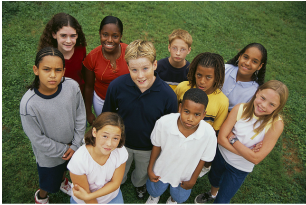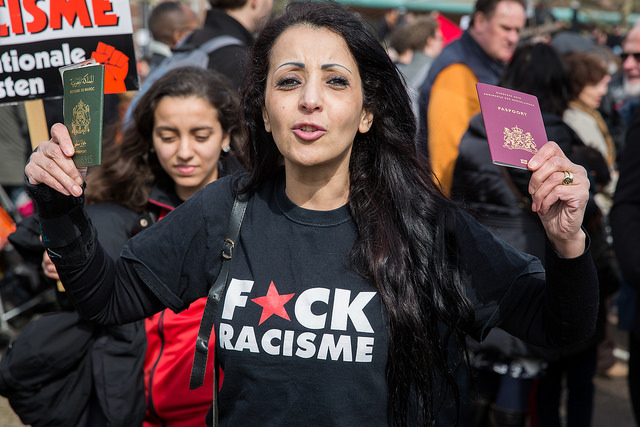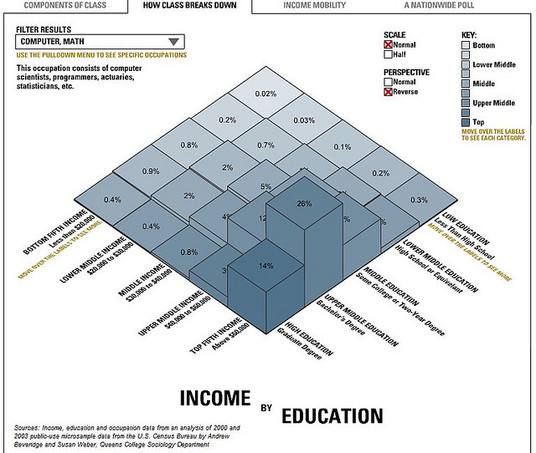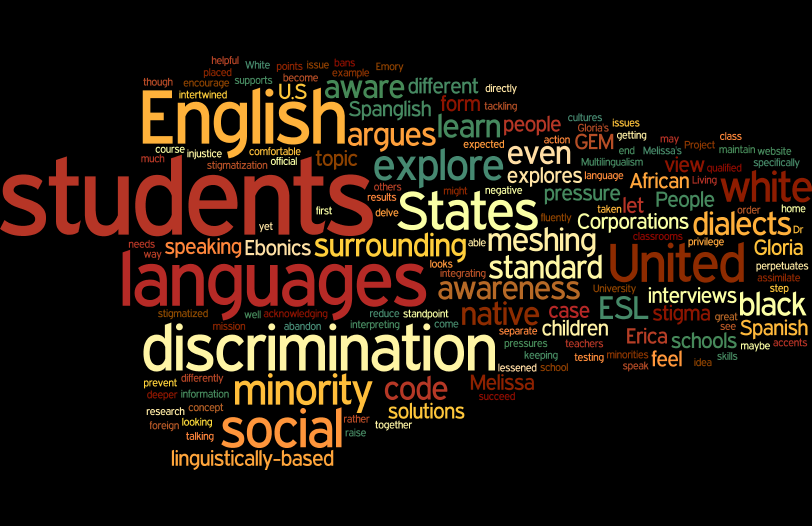Can Code Meshing Fix Our Problem?
Melissa DeFrank
What problem?
An issue that is often overlooked in education- language and dialect discrimination. That is, accents in stigma. The social pressures against minorities actually push from both sides; authority figures and white students at schools pressure everyone to speak “standard” English, while minority groups feel pressure to hold onto their natural, accented language. Within some groups that speak Black English (Ebonics), black students can be accused of “talking white;” that is, speaking in a standard English dialect associated with a mostly white population. Research and an interview of a student at Emory University prove that this discrimination does exist in some schools, is hurting children, and is keeping them from achieving their full potential. I forward Young’s idea that code meshing a great place to start to end the stigma on black students. I extend Young even further using research, claiming that code meshing can even alleviate income inequality, discrimination due to that, and stigmatization. However, I counter Young by bringing up a point he missed, the limits of code meshing.
What problem?
An issue that is often overlooked in education- language and dialect discrimination. That is, accents in stigma. The social pressures against minorities actually push from both sides; authority figures and white students at schools pressure everyone to speak “standard” English, while minority groups feel pressure to hold onto their natural, accented language. Within some groups that speak Black English (Ebonics), black students can be accused of “talking white;” that is, speaking in a standard English dialect associated with a mostly white population. Research and an interview of a student at Emory University prove that this discrimination does exist in some schools, is hurting children, and is keeping them from achieving their full potential. I forward Young’s idea that code meshing a great place to start to end the stigma on black students. I extend Young even further using research, claiming that code meshing can even alleviate income inequality, discrimination due to that, and stigmatization. However, I counter Young by bringing up a point he missed, the limits of code meshing.
social pressure within minority groups.
First, I will prove that black-on-black discrimination really does happen in schools so that we can move forward to find a solution. To do this, I will come to terms with research done by sociologists Tyson, Darity, and Castellino in eleven North Carolina high and middle schools. They chose a range of schools (from overrepresented to underrepresented in terms of minorities) and questioned African American students about their social and academic lives. They asked about things like the rigorousness of their courses, why they chose the courses they did, and if they were discriminated against by other students for any reason.
The study’s main conclusion was that each school is different depending on the social atmosphere. A great deal depends on school structure rather than a blanket statement. They found three sets of opposition:
The study’s main conclusion was that each school is different depending on the social atmosphere. A great deal depends on school structure rather than a blanket statement. They found three sets of opposition:
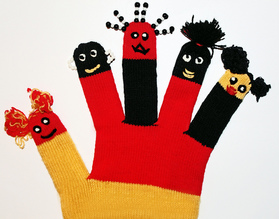 By Flickr user Daniela Hartmann. Click on picture for link.
By Flickr user Daniela Hartmann. Click on picture for link.
1) Against being a “dork” or “nerd,” something that crosses racial and cultural lines
2) Against black students that “act white,” called an “Oreo” for example
3) Against students that act “better than others,” based on socioeconomic ties
For now, we will focus on type two because this is what Meagan experienced and is a very concerning problem. In schools with this issue, both students and employees were aware of the minorities’ opposition to rigorous classes. Here is a quote explaining why this type of discrimination happens in certain social atmospheres:
"Teachers, principals, and counselors repeatedly traced the underrepresentation of minority students in the school’s advanced courses to aspects of an oppositional culture among minority students. Some adults noted that it is not “cool for minority students to be smart,” and that black students are “embarrassed” about their ability. Others maintained that black students “don’t place a high value on education,” and that males, especially, are “averse to success” because it constitutes “betraying their brothers”"(Tyson et al. 594).
2) Against black students that “act white,” called an “Oreo” for example
3) Against students that act “better than others,” based on socioeconomic ties
For now, we will focus on type two because this is what Meagan experienced and is a very concerning problem. In schools with this issue, both students and employees were aware of the minorities’ opposition to rigorous classes. Here is a quote explaining why this type of discrimination happens in certain social atmospheres:
"Teachers, principals, and counselors repeatedly traced the underrepresentation of minority students in the school’s advanced courses to aspects of an oppositional culture among minority students. Some adults noted that it is not “cool for minority students to be smart,” and that black students are “embarrassed” about their ability. Others maintained that black students “don’t place a high value on education,” and that males, especially, are “averse to success” because it constitutes “betraying their brothers”"(Tyson et al. 594).
so what?
This quote reveals detrimental problem here; black students at some schools stick together and compromise their education in order to stay loyal to the group. I believe that this is a major issue because it perpetuates the division between races. The amount of social control that friends have on each other is literally keeping them from performing at their best and feeling welcome in challenging classes.
This quote reveals detrimental problem here; black students at some schools stick together and compromise their education in order to stay loyal to the group. I believe that this is a major issue because it perpetuates the division between races. The amount of social control that friends have on each other is literally keeping them from performing at their best and feeling welcome in challenging classes.
meagan's experience.
I think the underlying cause of opposition to "talking white" is that Ebonics is such a large part of black culture, that embracing standard English can be seen as denying one's blackness. I will now give a specific example of an African American woman who attended a high school like the one described above, but sacrificed her social ties to the black crowd in order to be academically successful. Meagan Shaw is a freshman here at Emory University. In her interview, she describes the difficulties of being a studious minority in the United States. She describes the tight line she has to walk on, not feeling fully accepted in white or black crowds. Black peers have asked Meagan, “Why do you talk white? What are you trying to prove?” (DeFrank). However, she feels she must assimilate to sound like her white peers in order to be accepted in the professional world. Therefore, she experiences social pressure from all sides.
I think the underlying cause of opposition to "talking white" is that Ebonics is such a large part of black culture, that embracing standard English can be seen as denying one's blackness. I will now give a specific example of an African American woman who attended a high school like the one described above, but sacrificed her social ties to the black crowd in order to be academically successful. Meagan Shaw is a freshman here at Emory University. In her interview, she describes the difficulties of being a studious minority in the United States. She describes the tight line she has to walk on, not feeling fully accepted in white or black crowds. Black peers have asked Meagan, “Why do you talk white? What are you trying to prove?” (DeFrank). However, she feels she must assimilate to sound like her white peers in order to be accepted in the professional world. Therefore, she experiences social pressure from all sides.
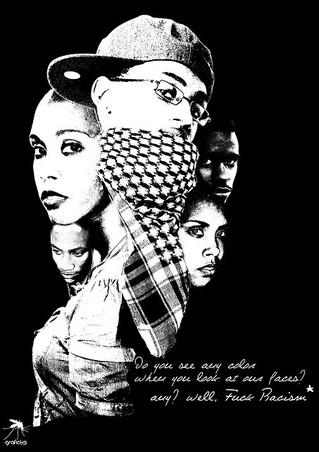 By Flickr user Akamï. Click on picture for link.
By Flickr user Akamï. Click on picture for link.
what's the solution?
I agree with Young's solution to this blatant discrimination. He only hints at it in Should Writers Use They Own English? when he says, “And another real, real, good result is we gone help reduce prejudice. Yes, ma’am. Now that’s a goal to reach for” (Young 71). Young defines code meshing as “multidialectism and pluralingualism in one speech act, in one paper” (67). His conclusion comes from his belief that race and dialect are inherently connected (61). If code meshing was allowed at Meagan's school, maybe she would feel more comfortable using slang phrases rather than holding back. Everyone in the school would learn about Ebonics, Spanglish, and other common minority languages. This kind of awareness and appreciation for underrepresented cultures could make a more accepting social environment. Perhaps other black students would be more sensitive towards Meagan's speech after being taught that about the dangers of language discrimination. This is one reason I believe code meshing should be acceptable and minority dialects should be taught in schools; to help students feel more comfortable being themselves, and prevent the formation of exclusive groups that hold students back academically.
the influence of socioeconomic status.
I will also use a research source to extend this argument further. Young says code meshing can alleviate internalized oppression, or people constantly feeling ashamed/stigmatized for being themselves. In Young’s argument, it is a stigma against Ebonics, which inherently connects to race. I will take this concept a step further using the same research, this time focusing on the third type of opposition, against students that act “better than others,” based on socioeconomic ties (Tyson et al.).
I agree with Young's solution to this blatant discrimination. He only hints at it in Should Writers Use They Own English? when he says, “And another real, real, good result is we gone help reduce prejudice. Yes, ma’am. Now that’s a goal to reach for” (Young 71). Young defines code meshing as “multidialectism and pluralingualism in one speech act, in one paper” (67). His conclusion comes from his belief that race and dialect are inherently connected (61). If code meshing was allowed at Meagan's school, maybe she would feel more comfortable using slang phrases rather than holding back. Everyone in the school would learn about Ebonics, Spanglish, and other common minority languages. This kind of awareness and appreciation for underrepresented cultures could make a more accepting social environment. Perhaps other black students would be more sensitive towards Meagan's speech after being taught that about the dangers of language discrimination. This is one reason I believe code meshing should be acceptable and minority dialects should be taught in schools; to help students feel more comfortable being themselves, and prevent the formation of exclusive groups that hold students back academically.
the influence of socioeconomic status.
I will also use a research source to extend this argument further. Young says code meshing can alleviate internalized oppression, or people constantly feeling ashamed/stigmatized for being themselves. In Young’s argument, it is a stigma against Ebonics, which inherently connects to race. I will take this concept a step further using the same research, this time focusing on the third type of opposition, against students that act “better than others,” based on socioeconomic ties (Tyson et al.).
Tyson’s research says that opposition to white culture also connects to socioeconomic status- some students associate standard English with whites, and they associate whites with privilege and wealth. As the study says, “…it seems likely that some students may choose lower-level academic classes, in which they can expect the comfort of being among peers of similar background, rather than advanced courses, in which they may anticipate feeling socially isolated or conspicuous in their difference. Some students also seem especially concerned to avoid being perceived as exhibiting the arrogance of privilege” (Tyson et al. 600). In populations where there is a considerable socioeconomic gradient, whites tend to be at the top of the ladder, and they usually push their children to take advanced courses. These white children are often called “snobby” or “snooty,” and other students are intimidated to take advanced courses because of this; minorities do not want to betray their social groups by being in a class with the snobby kids.
so what?
This is a major concern to me because I believe that race, language, and socioeconomic ties should never keep a child from achieving his/her full potential. This is another reason to test the hypothesis of integrating code meshing in schools. Having an authority figure like a teacher saying, “these minority accents and languages are just as valid as standard English” could help lift stigma off of Ebonics. As Young says about the enforcement of one type of English, “….one set of rules that people be applyin to everbody’s dialects leads to stereotypes that writers need “remedial training” or that speakers of dialects are dumb” (Young 64). If all dialects are taught and accepted in schools, maybe white students would feel more comfortable befriending minority students, and vice versa. I believe black students would stop being stigmatized for being themselves, and even more willing to take difficult classes and challenge themselves. I believe this would level opportunities, and blacks would be able to go to better colleges because they took harder classes.
This is a major concern to me because I believe that race, language, and socioeconomic ties should never keep a child from achieving his/her full potential. This is another reason to test the hypothesis of integrating code meshing in schools. Having an authority figure like a teacher saying, “these minority accents and languages are just as valid as standard English” could help lift stigma off of Ebonics. As Young says about the enforcement of one type of English, “….one set of rules that people be applyin to everbody’s dialects leads to stereotypes that writers need “remedial training” or that speakers of dialects are dumb” (Young 64). If all dialects are taught and accepted in schools, maybe white students would feel more comfortable befriending minority students, and vice versa. I believe black students would stop being stigmatized for being themselves, and even more willing to take difficult classes and challenge themselves. I believe this would level opportunities, and blacks would be able to go to better colleges because they took harder classes.
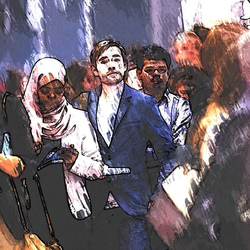 By Flickr user Zuleyka Zevallos. Click picture for link.
By Flickr user Zuleyka Zevallos. Click picture for link.
I will extend this idea further than just the classroom setting. If minority (and even poor white) children feel more comfortable in advanced classes, they will receive the kind of training needed for college. They will be in control of their future, rather than feeling inferior to the privileged rich children. They will attend better colleges, have higher paying jobs, and eliminate further misconceptions about minorities with accents sounding dumb. Eventually, if code meshing is implemented in enough schools, this causal process can lead to higher average earnings for blacks. As the wage gap between whites and blacks tightens, our society will improve in ways that are unimaginable. All of the small forms of discrimination that we witness every day would come to the surface to be contended. An example of a discrete form of discrimination is that black families receive worse service at restaurants and are sometimes even mistaken as valets or bathroom attendants (Yes, this really does happen, and it is appalling) (Goldwert). So much discrimination that plagues our society can be alleviated by this relatively simple change in teaching methods.
the shortcomings.
However, I need to address a shortcoming of this solution. Young says, “…we all should learn everybody’s dialect, at least as many as we can, and be open to them in oral and written communication” (Young 63). Until this point, I have only agreed with and extended Young; however, Meagan brings up a practical point. She says that her advanced classes would not allow code meshing because they were designed to prepare students for the SAT and college applications, both of which would never accept that kind of writing. By allowing people to “use they own English” in schools, are teachers setting students up for failure? Maybe it might not be a wholesome approach. While these children still be accepted in professional settings?
I believe that as long as students still learn some standard English, they will be able to do SAT writing and college writing just fine. Learning different dialects does not compromise intelligibility, but just the opposite (some of my classmates explored the cognitive benefits of multilingualism, but I will not get into that). By a social standpoint, code meshing would help students feel more comfortable to write freely and express ideas, which are invaluable skills for critical thinking. Ideally, it would be great to have a reformation of everything. For example, SAT scorers not grading for grammar but for content and organization. But this would take MAJOR transformation, especially to get colleges on board, and then employers on board. There are so many levels that it seems almost too difficult to accomplish.
However, I need to address a shortcoming of this solution. Young says, “…we all should learn everybody’s dialect, at least as many as we can, and be open to them in oral and written communication” (Young 63). Until this point, I have only agreed with and extended Young; however, Meagan brings up a practical point. She says that her advanced classes would not allow code meshing because they were designed to prepare students for the SAT and college applications, both of which would never accept that kind of writing. By allowing people to “use they own English” in schools, are teachers setting students up for failure? Maybe it might not be a wholesome approach. While these children still be accepted in professional settings?
I believe that as long as students still learn some standard English, they will be able to do SAT writing and college writing just fine. Learning different dialects does not compromise intelligibility, but just the opposite (some of my classmates explored the cognitive benefits of multilingualism, but I will not get into that). By a social standpoint, code meshing would help students feel more comfortable to write freely and express ideas, which are invaluable skills for critical thinking. Ideally, it would be great to have a reformation of everything. For example, SAT scorers not grading for grammar but for content and organization. But this would take MAJOR transformation, especially to get colleges on board, and then employers on board. There are so many levels that it seems almost too difficult to accomplish.
so, how can we make a change?
One step at a time. For now, teachers should explain to students that they must stick to mostly standard English on standardized tests. Until there is significant change in attitudes in the U.S., it will not be widely accepted in the professional world, and they must know this. But I believe it’s a good place to start. Whites in school will learn about other dialects and learn that no one is inferior for having an accent, and minorities will learn to appreciate their accents even more. These kids will grow up to be the leaders our nation. Changes may not be made on a large scale in this generation, but I believe they are coming soon.
how you can take this research further.
Unfortunately, I did not have the time to compile any more sources on this topic. It would be interesting to delve into this topic more and see how widespread this issue is. Another path I have thought of is, if code meshing works, how about culture meshing? What if students were educated not only about minority dialects, but about their cultures as well? This would bring even more awareness and might be a valuable solution to look into.
"Hypocrisy is the mother of all evil and racial prejudice is still her favourite child."
-Don King
sources.
DeFrank, Melissa. Meagan's Interview about Ebonics. Youtube. N.p., 22 Mar. 2015. Web. 1 Apr. 2015.
Goldwert, Lindsay. "'Dining while black' a real thing; 'table side racism' study shows waitstaff give African-Americans poorer service." New York Daily News. N.p., 25 Apr. 2012. Web. 1 Apr. 2015.
Tyson, Karolyn; Darity, William A., Jr.; & Castellino, Domini R. (2005). “It's Not "a Black Thing:" Understanding the Burden of Acting White and Other Dilemmas of High Achievement.” American Sociological Review, 70(4), 582-605. 23 Mar. 2015.
"Vershawn Ashanti Young, College of Liberal Arts and Sciences." FYI Faculty and Staff News. U of Iowa, n.d. Web. 23 Mar. 2015.
One step at a time. For now, teachers should explain to students that they must stick to mostly standard English on standardized tests. Until there is significant change in attitudes in the U.S., it will not be widely accepted in the professional world, and they must know this. But I believe it’s a good place to start. Whites in school will learn about other dialects and learn that no one is inferior for having an accent, and minorities will learn to appreciate their accents even more. These kids will grow up to be the leaders our nation. Changes may not be made on a large scale in this generation, but I believe they are coming soon.
how you can take this research further.
Unfortunately, I did not have the time to compile any more sources on this topic. It would be interesting to delve into this topic more and see how widespread this issue is. Another path I have thought of is, if code meshing works, how about culture meshing? What if students were educated not only about minority dialects, but about their cultures as well? This would bring even more awareness and might be a valuable solution to look into.
"Hypocrisy is the mother of all evil and racial prejudice is still her favourite child."
-Don King
sources.
DeFrank, Melissa. Meagan's Interview about Ebonics. Youtube. N.p., 22 Mar. 2015. Web. 1 Apr. 2015.
Goldwert, Lindsay. "'Dining while black' a real thing; 'table side racism' study shows waitstaff give African-Americans poorer service." New York Daily News. N.p., 25 Apr. 2012. Web. 1 Apr. 2015.
Tyson, Karolyn; Darity, William A., Jr.; & Castellino, Domini R. (2005). “It's Not "a Black Thing:" Understanding the Burden of Acting White and Other Dilemmas of High Achievement.” American Sociological Review, 70(4), 582-605. 23 Mar. 2015.
"Vershawn Ashanti Young, College of Liberal Arts and Sciences." FYI Faculty and Staff News. U of Iowa, n.d. Web. 23 Mar. 2015.
